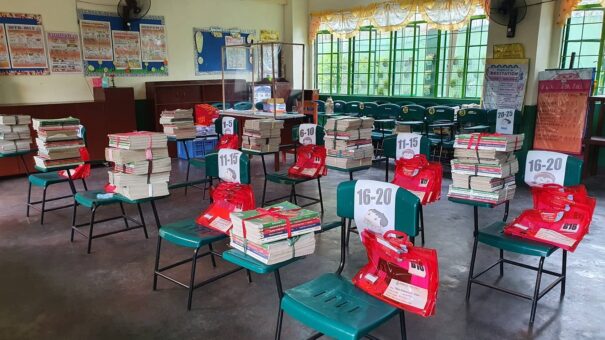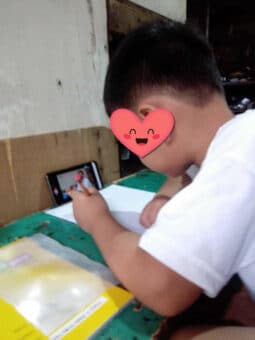The commitment of Youth for a United World in the Philippines to promoting initiatives to help students through the #daretocare project. “Online learning” has now become a feature of this pandemic. Governments all over the world are putting measures in place to reduce the risk of infection from Covid-19 whilst trying to maintain continuity with children’s education. Children no longer go to school physically but “meet” teachers and other students in “virtual classrooms”: the internet has become the new setting for their education. This new model has highlighted a number of difficulties for developed countries. Losing a direct relationship has a negative impact on the quality of teaching and deprives children of a “place” for growth and development which is human relationship. What is also significant is the discomfort that arises from a kind of enforced “cloistering” and the need to reorganize one’s daily life between smartworking, babysitting, medical appointments and various other commitments.  In developing countries and in rural areas which lack IT infrastructures, these social problems are further compounded by structural ones. Many regions have no internet connection and conditions for families who were already in financial difficulty have worsened because of the pandemic. These families can’t afford to buy educational materials, PCs or internet subscriptions for their children. All this has meant that the risk of an “educational catastrophe” that Pope Francis spoke of on 15 October in his Message for the event dedicated to the “Global Pact for Education” is very real. These difficulties are being felt by people in many parts of the Philippines. There, some of the Youth for a United World are teachers who have developed initiatives to help their students, putting into practice the #daretocare initiative which is about daring to take care of others, being active citizens who take an interest in everything that is happening around the world to try to build a united piece of the world.
In developing countries and in rural areas which lack IT infrastructures, these social problems are further compounded by structural ones. Many regions have no internet connection and conditions for families who were already in financial difficulty have worsened because of the pandemic. These families can’t afford to buy educational materials, PCs or internet subscriptions for their children. All this has meant that the risk of an “educational catastrophe” that Pope Francis spoke of on 15 October in his Message for the event dedicated to the “Global Pact for Education” is very real. These difficulties are being felt by people in many parts of the Philippines. There, some of the Youth for a United World are teachers who have developed initiatives to help their students, putting into practice the #daretocare initiative which is about daring to take care of others, being active citizens who take an interest in everything that is happening around the world to try to build a united piece of the world.  Frances Roble teaches primary school children. Some of her pupils come from the poorest families who do not have the educational materials they need to follow classes. To make sure their studies could continue, Frances appealed to the whole Focolare community to give them everything they need: “We pick ourselves up again together,” she explains, “by helping others in need to pick themselves up again. Ronald Allan Relador teaches in a public school. Unlike in previous years, his students had to register online at the beginning of this year to attend classes. Most, however, had neither a PC nor an internet connection. Ronald also worked hard to raise enough money to buy computers and register some of the students himself. However, the money raised was insufficient to cover all their needs. Then a well-known music band in the country decided to help by making a major donation. “I felt fulfilled and blessed to have done this,” he says, “God’s generosity is immense!” Jaquilyn Marie P. Jumuad also teaches in a primary school. She said that moving to online self-study has not been easy and has highlighted the difficulties many parents experienced of taking the place of teachers because they lacked a basic education themselves. “The help Youth for a United World offered,” she says, “has enabled us to give our students the level of education they needed.
Frances Roble teaches primary school children. Some of her pupils come from the poorest families who do not have the educational materials they need to follow classes. To make sure their studies could continue, Frances appealed to the whole Focolare community to give them everything they need: “We pick ourselves up again together,” she explains, “by helping others in need to pick themselves up again. Ronald Allan Relador teaches in a public school. Unlike in previous years, his students had to register online at the beginning of this year to attend classes. Most, however, had neither a PC nor an internet connection. Ronald also worked hard to raise enough money to buy computers and register some of the students himself. However, the money raised was insufficient to cover all their needs. Then a well-known music band in the country decided to help by making a major donation. “I felt fulfilled and blessed to have done this,” he says, “God’s generosity is immense!” Jaquilyn Marie P. Jumuad also teaches in a primary school. She said that moving to online self-study has not been easy and has highlighted the difficulties many parents experienced of taking the place of teachers because they lacked a basic education themselves. “The help Youth for a United World offered,” she says, “has enabled us to give our students the level of education they needed.
Claudia Di Lorenzi




0 Comments